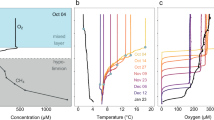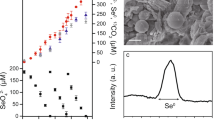Abstract
METHANE is a greenhouse gas whose concentration in the atmosphere is increasing1–3. Much of this methane is derived from the metabolism of methane-generating (methanogenic) bacteria4,5 and over the past two decades much has been learned about the ecology of methanogens; specific inhibitors of methanogenesis, such as 2-bromoethanesulphonic acid, have proved useful in this regard6. In contrast, although much is known about the biochemistry of methane-oxidizing (methanotrophic) bacteria7, ecological investigations have been hampered by the lack of an analogous specific inhibitor6. Methanotrophs limit the flux of methane to the atmosphere from sediments8,9 and consume atmospheric methane10, but the quantitative importance of methanotrophy in the global methane budget is not well known5. Methylfluoride (CH3F) is known to inhibit oxygen consumption by Methylococcus capsu-latus11, and to inhibit the oxidation of 14CH4 to 14CO2 by endosymbionts in mussel gill tissues12. Here we report that methylfluoride (MF) inhibits the oxidation of methane by methane monooxy-genase, and by using methylfluoride in field investigations, we find that methanotrophic bacteria can consume more than 90% of the methane potentially available.
This is a preview of subscription content, access via your institution
Access options
Subscribe to this journal
Receive 51 print issues and online access
$199.00 per year
only $3.90 per issue
Buy this article
- Purchase on Springer Link
- Instant access to full article PDF
Prices may be subject to local taxes which are calculated during checkout
Similar content being viewed by others
References
Rasmussen, R. A. & Khalil, M. A. K. J. geophys. Res. 89, 11599–11605 (1984).
Stauffer, B. et al. Science 229, 1386–1388 (1985).
Blake, D. R. & Rowland, F. S. Science 239, 1129–1131 (1988).
Wahlen, M. et al. Science 245, 286–290 (1989).
Cicerone, R. J. & Oremland, R. S. Global biogeochem. Cycles 2, 299–327 (1988).
Oremland, R. S. & Capone, D. G. Adv. microb. Ecol. 10, 285–383 (1988).
Anthony, C. The Biochemistry of Methylotrophs (Academic, San Diego, 1983).
Sansone, F. J. & Martens, C. S. Limnol. Oceanogr. 23, 349–355 (1978).
King, G. M. Nature 345, 513–515 (1990).
Whalen, S. C. & Reeburgh, W. S. Nature 346, 160–162 (1990).
Meyers, A. J. FEMS Microbiol. Lett. 9, 297–300 (1980).
Fischer, C. R. et al. Mar. Biol. 96, 59–71 (1987).
Culbertson, C. W. et al. Appl. envir. Microbiol. 41, 396–403 (1981).
Munoz, E. M. & Silverman, M. P. Appl. Microbiol. 28, 507 (1974).
Oremland, R. S. et al. Nature 296, 143–145 (1982).
Oremland, R. S. & Taylor, B. F. Appl. Microbiol. 30, 707–709 (1975).
Oremland, R. S. Appl. envir. Microbiol. 45, 1519–1525 (1983).
Oremland, R. S. Appl. envir. Microbiol. 56, 614–622 (1990).
Holzapfel-Pschorn, et al. FEMS microbiol. Ecol. 31, 343–351 (1985).
Sass, R. L. et al. Global biogeochem. Cycles 4, 47–68 (1990).
Author information
Authors and Affiliations
Rights and permissions
About this article
Cite this article
Oremland, R., Culbertson, C. Importance of methane-oxidizing bacteria in the methane budget as revealed by the use of a specific inhibitor. Nature 356, 421–423 (1992). https://doi.org/10.1038/356421a0
Received:
Accepted:
Issue Date:
DOI: https://doi.org/10.1038/356421a0
This article is cited by
-
Fish Mediate Surface Soil Methane Oxidation in the Agriculture Heritage Rice–Fish System
Ecosystems (2023)
-
Bark-dwelling methanotrophic bacteria decrease methane emissions from trees
Nature Communications (2021)
-
Warming and eutrophication interactively drive changes in the methane-oxidizing community of shallow lakes
ISME Communications (2021)
-
The significance of microbial community functions and symbiosis in enhancing methane production during anaerobic digestion: a review
Symbiosis (2021)
-
Biogeochemical transformation of greenhouse gas emissions from terrestrial to atmospheric environment and potential feedback to climate forcing
Environmental Science and Pollution Research (2020)
Comments
By submitting a comment you agree to abide by our Terms and Community Guidelines. If you find something abusive or that does not comply with our terms or guidelines please flag it as inappropriate.



